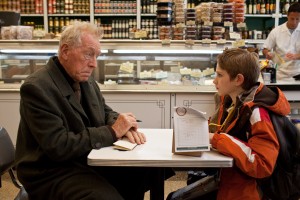Interview: Max von Sydow of ‘Extremely Loud and Incredibly Close’
Posted on January 18, 2012 at 11:59 pm
Max von Sydow plays the mysterious “renter” in “Extremely Loud and Incredibly Close,” opening this Friday. It is based on the acclaimed book by Jonathan Safran Foer about young boy named Oskar devastated by his father’s death on 9/11. Trying to make some sense out of what happened, the boy searches all over New York to try to solve the mystery behind a key his father left behind. He is accompanied on part of his quest by “the renter,” a mysterious, silent old man who has moved in to the apartment of the boy’s grandmother. The renter is mute and communicates by holding up his hands with “no” written on one palm and “yes” written on the other and by writing in a little notebook.
Von Sydow has had one of the most distinguished and wide-ranging international careers in movie history. He has played Jesus (“The Greatest Story Ever Told”) and the devil (“The Soldier’s Tale”). He has appeared in films directed by Ingmar Bergman and Woody Allen (“Hannah and Her Sisters”). He co-starred in “The Exorcist,” “Judge Dredd,” “Rush Hour 3,” and “The Adventures of Bob & Doug McKenzie: Strange Brew.” And now, age 82, he talked to me about playing a man who does not speak.
I loved the film. It was so moving.

It is a wonderful story. My wife and I read it and we were profoundly moved, both of us. It concerns everybody. This idea with this man who has decided not speak any more but who speaks by writing, it was a great pleasure and a great adventure. And it was a pleasure to work with Stephen Daldry. I like very much that he does plays, quite a lot of political material.
The whole row of critics I saw it with were snuffling by the end.
I always wonder. I have through the years got the feeling, maybe I am wrong, that if critics are moved, they hate the picture. They cannot accept their own emotion.
The movie wisely does not tell us to much about your character’s background and I think the mystery works well.
Did you read the book? In the book there is much more, but there are little hints in the film. You really have to keep your ears open to hear what is said. It is the boy who asks, “Why do you not speak” and suggests I had a shock of some kind. Later he says he knows why someone does not speak — either your vocal chords are ruined or you have come through a mental shock that has made you decide not to speak. And then in the scene in the bar where I have sort of left him on this bridge, he finds me in the bar drinking whiskey and writing messages that the barman reads, and he says, “I was born in Dresden.” I was apparently present when my family was totally annihilated in the fire-bombing in Dresden. Maybe today people don’t know about what happened there. But there little notes about what is the background for this man. And the grandmother’s attitude is interesting, also.
Is it a challenge to play a character who doesn’t speak, to give up one of the most important tools in an actor’s toolbox?
There’s no difference. The only difference is that he doesn’t speak. Just because I don’t speak in this part and write instead of speaking, had I been speaking I would have done exactly the same thing. I cannot say I would have to act differently because I don’t speak. I love in the city and I am together with this young boy and he does things and says things and I react positively or I object. I don’t think his thoughts are different because he does not speak. Don’t compare this thing with a silent film, a film like “The Artist.” It’s totally different. In a silent film, you speak but the audience does not hear you. Maybe there were actors in the silent films who in their physical behavior exaggerated their gestures to be better understood but you cannot compare that with this character. He does not speak but he is not a silent character.
Your character seems reclusive at first.
Grandmother has told him, “Okay you can live here and have this room but I don’t want you to have contact with Oskar. But of course this is the only thing he’s dreaming will happen. He hopes that something will change. When it finally happens it is not he who takes the initiative, it’s the boy. Grandmother tells the boy, “Don’t talk to this man. He can be very, very angry.” I love that part. She doesn’t scare him but she warns him that he can be very unpleasant.
You acted opposite a young boy who had no acting experience. How did you develop a working relationship with him?
He’s a very brilliant boy. He had never done TV, movies, no commercials, anything. When I first met him we went through a couple of scenes and talked about it. Stephen Daldry had him read his lines and it was very dry, no expression. But coming back to New York after a month and a half he was already a competent actor. He said his lines perfectly. He had some help, people who worked with him and he was very disciplined, remarkable patience. It was great fun to work with him.
He has a long, long monologue after he says, “Can I tell you my story?” He did it perfectly every time. I admired him.
